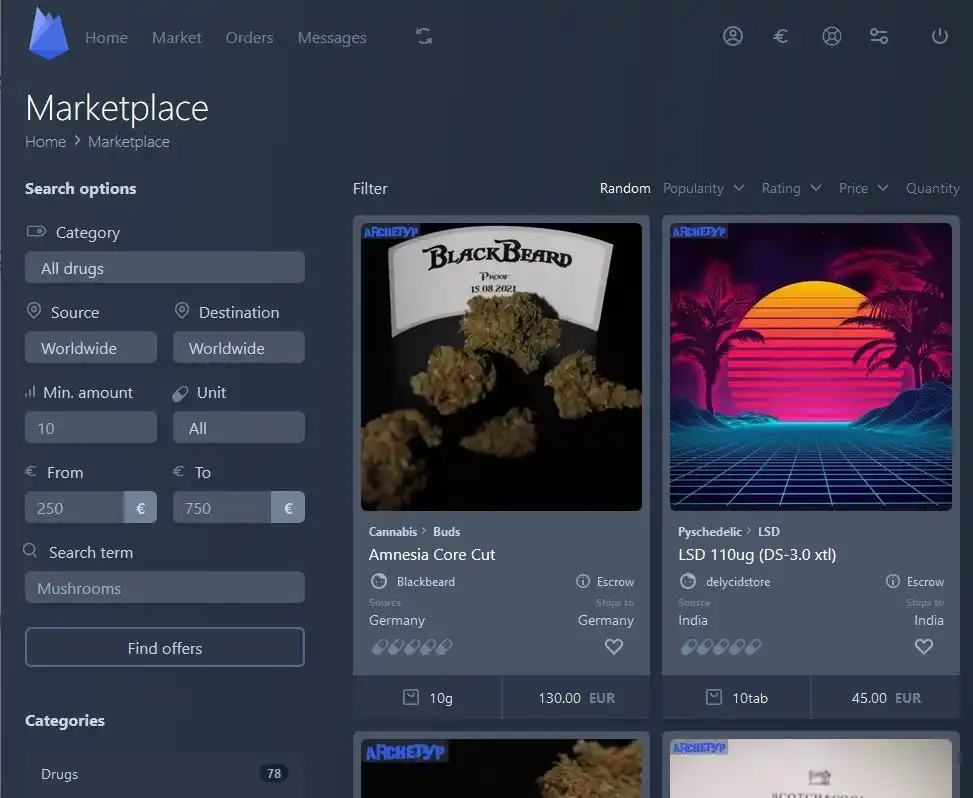Lately, this hidden web has intrigued people's minds, often conjuring images of covert deals, illicit goods, and a secret underworld operating past the reach of standard law enforcement. Among the most notorious aspects of this dark landscape are dark web markets, sites that support the exchange of everything from narcotics to counterfeit documents. As society becomes more and more digital, these markets have evolved, showcasing both the creativity and difficulties of the underground economy.
However, the rise of dark web markets is joined by their inevitable fall. Law enforcement agencies globally have ramped up efforts to penetrate and shut down these platforms, resulting in major raids that have sent shockwaves through the cyber underworld. The ongoing cat-and-mouse game between authorities and users has shaped the dynamic landscape of the darknet, revealing a complex interplay of anonymity, safety, and risk. As we dig into this subject, we will explore the origins, evolution, and ongoing challenges faced by dark web markets, illuminating a fascinating yet concerning aspect of today's world.

Understanding the Deep Web
The deep web is a section of the internet that is excluded by conventional search engines. It exists on an encrypted network, necessitating specific software such as Onion Router to get to it. This concealed nature allows users to operate without identification, making it a refuge for various activities, both permissible and criminal. While many may associate the deep web primarily with illegal transactions, it also serves as a platform for expression and confidentiality, especially in states with oppressive governments.
Accessing the hidden web involves using dedicated tools that protect users' personal information. The most common of these tools is the Tor web browser, which secures internet traffic and routes it through several servers. This creates a layer of anonymity for users, shielding them from watchfulness and tracking. Despite its image, the hidden web also provides forums, communities, and even marketplaces focused on lawful interests, such as privacy advocacy and political activism.
The complexity of the dark web presents a complex picture. On one hand, it is infamous for facilitating the trade of controlled substances, arms, and hacked information; on the other, it gives a sanctuary for whistleblowers and those desiring to communicate openly without concern of government intervention. Grasping this multifaceted landscape is crucial for apprehending the general significance of online privacy, security, and the persistent battle between law enforcement and the forces that exist in shadowy areas of the internet.
The Evolution of Darknet Markets
Hidden marketplaces have witnessed considerable changes since their beginnings in the early 2000s. Initially, these platforms were rudimentary and limited, primarily operating through forums and basic chatrooms where individuals would exchange goods and services lacking any formal interface. The discretion offered by the darknet attracted a niche audience interested in accessing products that were frequently illegal or difficult to obtain through conventional means. Notable early examples include Silk Road, which set the stage for subsequent markets by utilizing Bitcoin as a means of payment, enhancing the confidentiality of its participants.

As online security measures increased and law enforcement began to crack down on early markets, darknet markets evolved into more sophisticated entities. This evolution led to the introduction of intuitive interfaces and enhanced escrow systems that bolstered trust and protection among users. Rivalry among markets encouraged innovation, resulting in capabilities like customer ratings, vendor verification, and item evaluations. These developments not only refined the shopping experience but also attracted a wider audience, fostering a sense of connection among participants who valued the privacy that darknet markets provided.
Nevertheless, the rise of these markets also initiated a cycle of law enforcement intervention. darknet marketplace Significant operations to dismantle major platforms, such as the takedown of Silk Road in the year 2013, showcased the vulnerabilities inherent in the darknet infrastructure. Despite these efforts, emerging markets quickly emerged to fill the void, often implementing stronger security measures and using decentralized architectures to escape detection. This continuous battle between advancement in darknet market operations and law enforcement strategies illustrates a complex dynamic, making the transformation of darknet markets a perpetually unfolding narrative.
A Diminution and Outlook of Underground Commerce
The decline of shadow net markets can be attributed to multiple factors, including escalated police efforts and heightened oversight from internet security specialists. As officials around the world have ramped up efforts to shut down major sites, many have discovered it more challenging to operate without the constant threat of a closure or detainment. Prominent closures such as The Silk Road and Alpha-Bay served as crucial turning points, creating a sense of dread within the underground community and deterring new vendors from participating in the marketplace. Additionally, the unwillingness of participants to have faith in new platforms, often afflicted by fraud or safety breaches, has further added to the recession.
Despite the difficulties faced by operating sites, there still exists a significant demand for products and offerings that the dark web provides. This need may help sustain smaller, more niche platforms that work under a lower visibility. Innovative solutions, such as decentralized options and upgraded security systems, could revive demand and involvement of shadow net sites. As long as there are people seeking privacy for various reasons, from privacy factors to criminal actions, the potential for dark web commerce will always be present, albeit in a changed form.
Gazing forward, the prospects of dark web trade is likely to move towards greater decentralization and integration of crypto systems. The emergence of digital currencies has offered a more protected method of exchange that is inviting to users trying to maintain anonymity. As the scene changes, upcoming commerce models may include decentralized finance systems, making these platforms more difficult to close and control. While the decline of old-school shadow net platforms may signify the closure of an epoch, it creates opportunities to fresh prospects that could transform how trade happens in the shadows.
